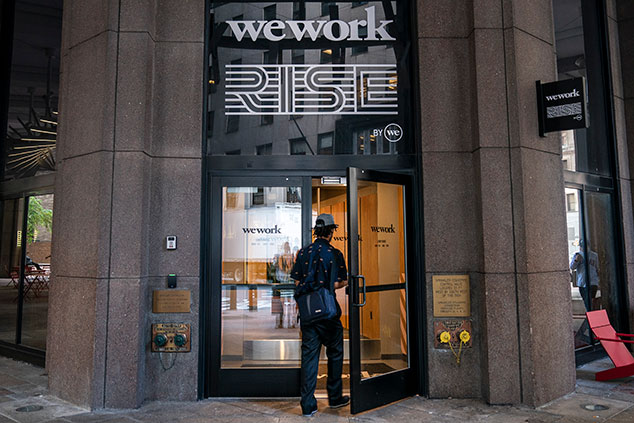
This article is taken from our FREE daily investment email Money Morning.
Every day, MoneyWeek’s executive editor John Stepek and guest contributors explain how current economic and political developments are affecting the markets and your wealth, and give you pointers on how you can profit.
Here’s a turn up for the books.
The IPO deemed “most likely to mark the top of the market” (by me, at least) is not going ahead.
Yet.
WeWork – the office space rental group that wants to “elevate the world’s consciousness” – has gone back to the drawing board after a litany of ridicule saw it forced to trim its hoped-for valuation by around 75%.
It seems that the world’s consciousness just ain’t elevated enough.
The WeWork flop suggests that stocks are expensive, but not exuberant
By any objective measure, the US stockmarket is trading on high valuations compared to history. The only time it’s been more expensive, judged by most measures, was during the tech bubble.
This is a market where people are willing to pay high prices. This is a market that has not hitherto balked at buying companies where the founder holds most of the voting rights at the expense of ordinary shareholders. This is a market that paid good money for Uber, a company that actually warned in its IPO document that it may never “achieve profitability”.
And yet, even this hugely forgiving, chronically credulous, jam tomorrow, ultra-low-interest-rate-addled market does not feel stupid enough to buy WeWork.
That’s interesting.
The one ingredient that has been missing from the long bull market in US stocks – and it’s one that has been bugging Jeremy Grantham of US wealth manager GMO too – is any obvious sign of full-on exuberance.
That’s why I’ve been keeping an eye on WeWork. If the company had been able to get markets to lap it up at the proposed price, then that would have demonstrated, I feel, a significant amount of exuberance.
But it couldn’t.
At its last fund raising in January, private investors in WeWork – led by SoftBank, the Japanese technology investor, with its Vision Fund – valued the company at $47bn. By the end of last week, notes the FT, bankers were sounding investors out about a valuation of between $15bn and $18bn.
Unsurprisingly, SoftBank wasn’t keen on the idea of crystallising its investment at that sort of loss (more on that in a moment). Especially not after Uber’s underwhelming IPO (yes, SoftBank owned a big chunk of Uber too).
What happens now that the private company bubble is popping?
Now all is not lost, top-of-the-market watchers. WeWork is apparently still considering an IPO later this year or in early 2020. You do have to wonder what might have changed by then, but equally, it never ceases to amaze me how rapidly markets can change their minds about truths that yesterday seemed etched in stone.
And of course, WeWork does have the problem that it needs to raise more money and without the IPO its current plans for doing that are scuppered. So it’s still one to watch closely.
But perhaps what’s more interesting is what this says about the “unicorn” frenzy of recent years. As my colleague Merryn Somerset Webb pointed out in a recent blog, there are a lot of other companies with business models that hinge on never having to make any money waiting in the wings.
If WeWork can’t list, then what does that mean for these companies? And in turn, what does it mean for those who bought stakes in them at ridiculously high levels on the private market, because they were convinced they would always be able to flip them on the stockmarket at a higher price at a later date?
The unicorn bubble has been the very definition of a market led higher by a belief that there would always be a “greater fool”. Now the joke is on them.
As the FT points out this morning, “you wouldn’t know by looking at SoftBank’s public statements, which show the Vision Fund investments performing strongly, that the company could be forced to swallow huge write downs.”
The thing about private markets is that it’s much harder to value an asset objectively. When a company is listed, you can get a very good idea of its value – the flow of buyers and sellers is constantly rendering a judgement that you can rely on.
But when a company is private, there are far fewer opinion formers involved. Was WeWork really worth $47bn in January, but now only worth less than $15bn? Of course not. It’s just that its biggest backers thought it was worth $47bn, but the market of potential buyers happens to disagree. And quite strongly disagree at that.
If you think your house is worth £1m, but you can only sell it for £500,000, then you’re going to have to rethink your future plans. It’s a similar story for SoftBank. It’ll be interesting to see how the Vision Fund’s backers (which include the sovereign wealth funds of both Saudi Arabia and Abu Dhabi) react when the fund’s performance figures (which have been buoyant thus far) have to take into account the pending write downs.
I’ll keep you posted.